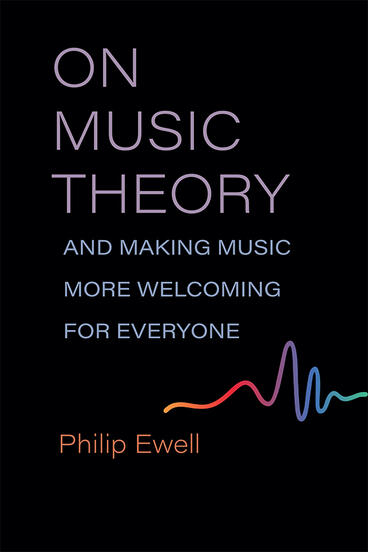On Music Theory, and Making Music More Welcoming for Everyone
Exposing the racial injustices of music theory
Description
Since its inception in the mid-twentieth century, American music theory has been framed and taught almost exclusively by white men. As a result, whiteness and maleness are woven into the fabric of the field, and BIPOC music theorists face enormous hurdles due to their racial identities. In On Music Theory, Philip Ewell brings together autobiography, music theory and history, and theory and history of race in the United States to offer a black perspective on the state of music theory and to confront the field’s white supremacist roots. Over the course of the book, Ewell undertakes a textbook analysis to unpack the mythologies of whiteness and western-ness with respect to music theory, and gives, for the first time, his perspective on the controversy surrounding the publication of volume 12 of the Journal of Schenkerian Studies. He speaks directly about the antiblackness of music theory and the antisemitism of classical music writ large and concludes by offering suggestions about how we move forward. Taking an explicitly antiracist approach to music theory, with this book Ewell begins to create a space in which those who have been marginalized in music theory can thrive.
Philip Ewell is Professor of Music Theory at Hunter College of the City University of New York.
Reviews
"This book may represent the cusp of a racial reckoning for music theory in the US. [E]veryone—students and
- Choice, B. J. Murray, Miami University
faculty—involved in music theory should read it. . . Essential."
“Philip Ewell’s sweeping and brave On Music Theory is certain to make an indelible mark on our discipline. Ewell’s racial re-framing of the discipline’s intellectual heritage draws forth conclusions that are by turns powerful, shocking, revealing, and ultimately hopeful. The book will be vital to the future growth of music theory as an academic discipline.”
- Roger Mathew Grant, Wesleyan University, Author of Peculiar Attunements: How Affect Theory Turned Musical
“Phil Ewell kicked the hornet’s nest in 2019 in a conference paper on the white racial frame of standard music theory. He was not the first to question tonality’s hierarchical principles whereby the dissonant other must be subsumed or eliminated for the sake of harmony: Schoenberg, George Russell, Christopher Small, and feminist theorists have raised similar critiques. But three years of panels, denunciations, and lawsuits have not settled the controversy over Ewell’s presumed transgression. In On Music Theory, he mounts a detailed defense of his arguments, as well as an account of the repercussions that followed in the wake of his talk. A crucial book for those involved in the ongoing debates over covert biases in academic disciplines.”
- Susan McClary, Case Western Reserve University, Author of The Passions of Peter Sellars: Staging the Music
“On Music Theory leaves no doubt about the discipline’s deeply ingrained antiblackness. In doing so, Ewell successfully demonstrates that the problems facing music theory are systemic and not simply the fault of a few bad actors. The book provides a framework and vocabulary that will enable future scholars to identify and challenge racism in the field and demonstrates a new approach to music theory that draws on interdisciplinary scholarship about race.”
- Loren Kajikawa, George Washington University, Author of Sounding Race in Rap Songs
"It is an essential component of a longer anti-racism reading list for anyone engaging in academic music disciplines today."
- Robin Attas, University of Manitoba
"On Music Theory is a unique book for a unique time, filled with critical materials and action
- Music Theory Online: A Journal of the Society for Music Theory
items that justify its position as a central text in music theory’s antiracist turn. . . . We hope that On Music Theory can begin a new era of disciplinary change based in collective action, respectful disagreement, and methodological diversity."
"Ewell deserves profound acknowledgment for
- Journal of the American Musicological Society
doing the grueling work of unraveling a particularly insidious, intractable,
and deeply embedded mode of racialized, gendered, and institutionalized
hegemony. One can only imagine the experiences that inspired him to
write this book, but like the artists mentioned above, he has transmuted
those experiences, and by extension those of many others, into a powerful
disciplinary critique that is likely to stand as a watershed moment in the
evolution of Western music theory."
News, Reviews, Interviews
Winner: 2024 PROSE Award for Music and Performing Arts | March 5, 2024
Read: Interview in Current Affairs| December 1, 2023
Listen: Interview on Current Affairs podcast with Nathan Robinson | September 26, 2023
Listen: Interview on Information Morning Nova Scotia with Portia Clark | September 14, 2023
Listen: Interview on Our Body Politic podcast with guest host Celeste Headlee | September 1, 2023
Listen: Interview on Sound Expertise podcast with Will Robin | August 29, 2023
Listen: Interview on Music Ed Insights podcast with Steve Shanley and Alan Feirer | August 28, 2023
Listen: Interview on New Books in Music podcast with host Kristen Turner | May, 2023
Listen: Interview on Her Music Academia with Lydia Bangura | February 2023

